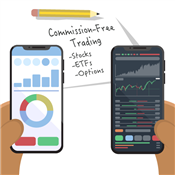M1 Finance vs Robinhood vs Webull
M1 Finance, Robinhood, and Webull are the three most popular no-fee investment apps. Find out which fits your needs best.
 |
So, you're thinking of using an app to invest? Three names you've likely heard of are M1 Finance, Robinhood, and Webull.
But which one best fits your investment goals?
Although investing is much easier today, it has a downside. There are so many options, it's hard to make your pick. All three of these apps perform a similar service—free online trades. But each excels in different areas.
Before making a decision, review the in-depth breakdown of different features, fees, and investment options.
Who Each One Is Best For
- M1 Finance is best if you're a long-term passive investor wanting to set your investments and forget them.
- Robinhood is best if you're new to active trading and looking to save money on fees.
- Webull is best if you're an advanced trader looking for more research tools, customer support, and margin trading.
A Quick Overview of the Three Apps
| M1 Finance | Robinhood | Webull | |
|---|---|---|---|
| Account Minimum | $100 ($500 for IRAs, $5,000 for Trust Account) | $0 | $0 |
| Fees* | No commission; Monthly platform fee (can be waived) | No commission or account management fees | No commission or account management fees |
| Investment Opportunities | Stocks, ETFs, Crypto | Stocks, ETFs, Options, Crypto | Stocks, ETFs, Options |
| Account Options | Brokerage, Retirement, & Joint | Brokerage & Margin | Brokerage, Margin, & Retirement |
| Features | -Dynamic Rebalancing -Pre-built portfolios -Borrow up to 50% of portfolio -Automatically reinvest dividends | -Extended trading hours -Instant deposits -Free debit card | -Extended trading hours -Advanced research tools -Short selling |
| Cons | No human financial advisors | Lack of transparency | Overwhelming interface |
| Customer Support | Chat, email, and by phone during business hours | email and by phone 24/7 | Chat, email, and by phone 24/7 |
*Each app charge fees for extra services, which we cover below.
What All Three Offer
Before diving into the full comparisons, let's go over what you can expect from all three of these apps.
All three offer:
- No account opening fees
- No trading fees
- No deposit or withdrawal fees to or from your linked bank
- Low minimum deposit to start
- Fractional shares or a low minimum trade amount
- Individual taxable accounts and retirement accounts
- Able to trade stocks and ETFs
- Automatically reinvest your dividends
- SIPC protection up to $500,000
- All are registered brokers with the SEC
- Phone support
How They Are Different
The main differences between these three investing apps are:
- Portfolio Management: In general, M1 Finance is best for investors who want help managing their portfolio. It comes with more than 60 pre-made portfolio options. Robinhood and Webull require you to choose your investments manually.
- Automatic Rebalancing: M1 Finance will automatically rebalance your portfolio, according to your desired allocation. Robinhood and Webull will not.
- Minimum Account Balance: M1 Finance requires a $100 minimum account balance. Meanwhile, Robinhood and Webull do not have a requirement.
- Trading Hours: Robinhood and Webull have extended trading hours. M1 Finance offers morning and afternoon trade windows.
- Margins Trading: Webull offers you a free margin trading account. Robinhood also allows margin trading with interest rates based on your total margin balance. M1 Finance does not offer margin trading but does let you borrow up to 50% of your portfolio.
- Research Tools: M1 Finance and Robinhood offer limited analytics tools. Webull has advanced tools and indicators in the app.
Why Choose M1 Finance
M1 Finance is great for new investors who want some help choosing and managing their portfolio.
With M1 you can create a custom portfolio (called Pies), and M1 Finance will manage it for you. That's why it's great for passive investing because you only need to create the portfolio. M1 will take over and do the work.
Whenever you make adjustments to your portfolio or deposit money, M1 will automatically buy and sell stocks for you.
If you're not sure what to invest in, there are more than 60 pre-built portfolios. You can choose from them to build a balanced portfolio quickly.
M1 also lets you buy fractional shares, so there's no minimum trade amount. It will automatically reinvest your dividends too.
Finally, M1 offers a loan service that lets you borrow up to 50% of your portfolio.
You may like M1 Finance if you:
- Want to spend as little time on your investments as possible
- Want help balancing your portfolio
- Are a long-term investor
- Want to borrow from your investments
Pros:
- 100% commission-free
- Pre-made Model Portfolios created by M1
- Buy fractional shares
- Retirement accounts are supported
Cons:
- No human financial advisors
- Pies can be a challenge to create at first
- No options, mutual funds, or short selling
Commission Free Stock Trading
M1 Finance allows investors the choice of ETFs and stocks. M1 charges $0 commission fees on trading
Why Choose Robinhood
Robinhood is one of the most user-friendly apps. Which is why it's so popular with beginners.
You have many trading options, such as buying stocks, ETFs, and options. There are 15 cryptocurrencies to choose from. You also can execute orders, including limit, stop limit, and stop orders.
The extended trading hours allow you to make trades 2.5 hours before the market opens and 4 more hours after it closes.
It's a great app for active traders as you can perform 3 day trades in a 5 trading day period. You can also get instant deposits of up to $1,000 to your bank, so no waiting for 5 days.[1]
Finally, it has research tools like real-time market updates on stocks in your watch list. There are candlestick charts and indicators for watching your favorite investments too.
You may like Robinhood if you:
- Are a new investor and want an easy-to-use app
- Want complete control over managing your investments
- Are an options trader
Pros:
- 100% commission free
- No minimum investment to start
- No minimum trade amount with fractional shares
- Free Cash Card
Cons:
- No mutual funds, bonds, or short selling
- Only basic research tools
Why Choose Webull
Webull has the most advanced features and tools. These will appeal to active, swing, and margin traders.
You can trade stocks, ETFs, and options. You can also use accounts beyond just the individual taxable. Webull offers Traditional, Roth, and Rollover IRAs.
It has the longest extended trading hours—from 4 am to 8 pm. You can also place 3 day trades in a 5 trading day period.
Webull gives you a free margin account with 4x buying power and supports short selling.
Another unique feature is the virtual paper trading account with unlimited virtual money. This is a fantastic feature for beginning investors.
Webull's more advanced research tools include market data. They cover 5 categories and 100+ exchanges, 60+ technical indicators, and 17+ charting tools.
You may like Webull if you want:
- The most options for margin trading
- Want to invest in your IRA
- As many research tools as possible
- To paper trade with unlimited virtual cash
Pros:
- 100% commission-free trades
- No account minimums
- Fractional shares starting at $5
- Free margin account
- More advanced charts and indicators
Cons:
- Interface can be overwhelming
- No mutual funds
Fund and Get 4% Match Bonus
Enroll in this offer, and transfer or deposit $100,000 or more to your Webull account. Maintain a total net qualifying funding amount of $100,000 or more until the payment date of the final installment of the match bonus. The match bonus will be paid in 6 installments. The first installment will be issued on or about May 15, 2026.
How The Fees Compare
All three apps have no fees on their most important features:
- No account opening fees
- No trade fees
- No deposit or withdrawal fees from your bank
Still, there are some differences in their fees for extra features:
- Robinhood and Webull do not have an inactivity fee. But M1 Finance will charge $50 (for accounts with $50 or less and no trading or deposit activity for 90+ days).[2]
- Webull has a free margin trading account. Robinhood also offers margin trading but a zero interest rate on the first $1,000 of margin borrowed is offered with their premium service, Gold (up to $6.99 a month).[3]
- M1 Finance and Webull charge fees for wire transfers. Robinhood does not.
All the apps have some fees for extra services, such as paper statements. You can see the current fee schedules for M1 Finance, Robinhood, and Webull.
The apps also charge the mandatory regulatory expenses, which work out to be a few pennies per trade. Some exchanges charge small fees as well, which you would be responsible for.
Robinhood and Webull have no management fees, while M1 Finance charges a monthly platform fee that can be waived under certain conditions. A $3 monthly platform fee will apply to clients with less than $10,000 in M1 assets or without an active M1 Personal Loan.
Investment Account Options
| M1 Finance | Robinhood | Webull | |
|---|---|---|---|
| Stocks | 6,000+ stocks & ETFs | 5,000+ stocks and ETFs | 5,000+ stocks and ETFs |
| Options | Not offered | Offered | Offered |
| Crypto | Yes | 10+ cryptocurrencies | Not offered |
| Individual Taxable | Yes | Yes | Yes |
| IRAs | Traditional, Roth, Rollover, and SEP | Traditional and Roth | Traditional, Roth, and Rollover |
| Margins | No | Yes | Yes |
| Loans | You can borrow up to 50% of your portfolio | No | No |
| Other Accounts | Custodial, Trust, & Joint accounts | Not offered | Not offered |
There are plenty of investment options on all three apps. But there are differences between them.
With M1 Finance, you can invest in more than 6,000 stocks and ETFs. You can also manage joint accounts and non-taxable accounts like IRAs. It also offers cryptocurrency trading, but you'll need to open a Crypto account to access this feature.
With Robinhood, you can invest in 5,000 stocks as well as ETFs, options, and 10+ cryptocurrencies. Robinhood offers individual taxable accounts and retirement accounts.
With Webull, you can invest in more than 5,000 stocks, options, and ETFs. You can also trade margins and use non-taxable accounts like IRAs.
Of course, each app adds more stocks and options as often as possible. So, results will differ from month to month.
In addition to different investment account options, each app offers unique features that could be a great fit for your goals.
M1 Finance Features
With M1 Finance, you have 4 account options: Earn, Spend, Invest, and Borrow.
Robinhood Features
With Robinhood, you have different account options: Instant, Crypto, Cash Card, Gold, and IRAs.
- Instant is their main service. It lets you invest, receive instant deposits up to $1,000, and get instant access to your funds after selling.
- Crypto is their crypto exchange, with 0% fees and 10+ cryptocurrencies.
- Cash Card is a debit card that is connected to a spending account separate from brokerage account. The card gives you weekly rewards that helps you invest in your choice of assets when spending money. It has no monthly fees, no in-network ATM fees, no overdraft fees, and no account minimum fees.
- Gold is their premium trading account and costs up to $6.99 per month. You can also receive instant deposits of up to $50,000.[4]
- Retirement (Traditional and Roth IRA) is their new retirement program. You can choose to invest in stocks and ETFs through traditional or Roth IRA.
Webull Features
With Webull, you have 3 account options: Cash, Margin, and Paper.
- Cash is their main service. You can invest in stocks, ETFs, options, and cryptocurrencies using taxable or non-taxable accounts.
- Margin is their free margin account where you can get leverage and short sell. You have 4x day trade buying power and 2x overnight buying power. Interest rates are tiered and decrease with higher balances.[5]
- Paper trading is their free service. It lets you virtually trade unlimited "paper" money.
Are They Safe?
All three investment apps have plenty of safety features.
- SIPC insured. SIPC is a federal corporation that protects securities up to $500,000 per account.
- Member of FINRA. Each is a registered broker of the Financial Industry Regulatory Authority.
- Member of SEC. Each is a registered broker of the U.S. Securities and Exchanges Commission.
- Two-factor authentication.
- Industry-standard encryption.
M1 investment accounts are insured by the SIPC, providing standard protection of up to $500,000 (including $250,000 for cash claims). It has military-grade encryption and offers fingerprint ID or face ID for authentication.
Robinhood also protects $250,000 for cash claims. It has Bcrypt encryption, which many similar companies use. It also offers device approvals, authenticator apps, and text messages for authentication.
Webull protects $250,000 for cash claims. Apex Clearing also insures your investments for up to $37.5 million in securities and $900,000 in cash for each account. It offers 128-bit encryption and will send messages to your phone or email for authentication.
Customer Support
These apps are not well-known for their top-notch customer support. This is one way they save on costs so they can offer services without fees. But each offers limited services to customers.
Webull has the most options for customer support. You can use their in-app chat, email, and phone number to reach customer service 24/7. But it could take a while to reach a real person.
M1 Finance has instant chat, email, and a phone number to reach customer service during business hours.
Robinhood offers customer support via chat 24/7 and phone 7AM to 9PM ET.
Promotions
3% Match on IRA with Robinhood Gold
Earn 3% IRA match on all eligible contributions with Robinhood Gold. Terms and conditions apply. This is a limited-time offer.
1% Match on IRA
Earn 1% IRA match on all eligible contributions to your Robinhood IRA. Terms and conditions apply. This is a limited-time offer.
2% Match on IRA Transfer with Robinhood Gold
Receive a 2% match bonus when you transfer or roll over an IRA. Subscription with Robinhood Gold is required to earn the 2% bonus. The fund must stay in the account for a minimum of 5 years. Terms and conditions apply.
Fund and Get 4% Match Bonus
Enroll in this offer, and transfer or deposit $100,000 or more to your Webull account. Maintain a total net qualifying funding amount of $100,000 or more until the payment date of the final installment of the match bonus. The match bonus will be paid in 6 installments. The first installment will be issued on or about May 15, 2026.
Fund and Get 3% Match Bonus
Enroll in this offer, and transfer or deposit $2,000 or more to your Webull account. Maintain a total net qualifying funding amount of $2,000 or more until the payment date of the final installment of the match bonus. The match bonus will be paid in 6 installments. The first installment will be issued on or about May 15, 2026.
Up to $100 Transfer Fee Reimbursement
Transfer fees of up to $100 will be reimbursed when you make an initial transfer of $2,000 or more.
Up to $75 IRA Transfer Fee Reimbursement
Transfer fees of up to $75 will be reimbursed when you make an initial transfer of $5,000 or more.
Webull Premium - 3.5% Match on IRA Contributions
Earn a 3.5% match bonus for every qualifying contribution into a Webull IRA. Customers must be subscribed to Webull Premium to be eligible for the match bonus. Terms and conditions apply.
The information for this offer has been collected independently by CreditDonkey. The details on this page have not been reviewed or provided by Webull.
Webull Premium - 3% Match on IRA Transfer
Earn a 3% match bonus when you transfer or roll over assets into a Webull IRA. Assets must be new to Webull and customers must be subscribed to Webull Premium to be eligible for the match bonus. Terms and conditions apply.
The information for this offer has been collected independently by CreditDonkey. The details on this page have not been reviewed or provided by Webull.
$0 Commission on 50 Futures Contracts
Open a Futures account and make a single initial deposit of $500 or more during the promotion period. Get $0 commission on up to 50 Futures contracts and free CME Level 2 Market Data for 3 months. Terms and conditions apply.
This offer has been collected independently by CreditDonkey. The details on this page have not been reviewed or provided by the bank.
Bottom Line
M1 Finance is best for new investors who don't want to think too much about their investments. The Pies feature is easy to follow. And their options help automatically rebalance your portfolio, grow it passively, and reinvest your dividends. But it charges a platform fee, though it's waivable if you meet certain requirements.
Robinhood is better for new active traders who want a dead-simple interface. And full control over their investments. It also has low fees. This is the best app if you like managing your trades and want to trade options. This is why it is by far the most popular of the three apps.
Webull is for more advanced traders who want their research tools in the app. It can be overwhelming at first, but it has everything you need to track your investments. Plus, the free margin trading account has the most options. The ability to trade your retirement accounts gives it an advantage over Robinhood.
References
- ^ Robinhood. About Instant Deposits, Retrieved 07/17/2024
- ^ M1 Finance. M1 Fee Schedule, Retrieved 07/17/2024
- ^ Robinhood. Robinhood Financial's Fee Schedule, Retrieved 07/17/2024
- ^ Robinhood. What are bigger Instant Deposits?, Retrieved 07/17/2024
- ^ Webull. Tiered Margin Interest Rates, Retrieved 07/17/2024
Ben Jenks is a editor at CreditDonkey, a personal finance comparison and reviews website. Write to Ben Jenks at ben@creditdonkey.com. Follow us on Twitter and Facebook for our latest posts.
Note: This website is made possible through financial relationships with some of the products and services mentioned on this site. We may receive compensation if you shop through links in our content. You do not have to use our links, but you help support CreditDonkey if you do.
|
|
|





